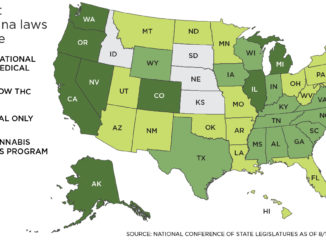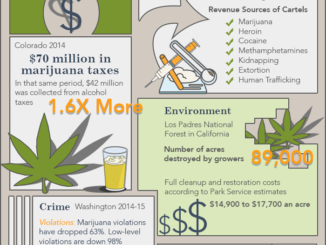
I chose to become a traffic ticket attorney because I have very strong feelings about helping protect the rights of others. Yet, as an attorney, I try to remain neutral about certain subjects, and one of those subjects is the legalization of marijuana. Marijuana and the effects that it has on any given individual is not my area of expertise, but advocating that you do not engage in any illegal activities is definitely one of my responsibilities as an attorney. Much to the disappointment of many, the use of marijuana is still illegal in the State of Florida. Consequently, how I feel about its use is irrelevant.
Now that I have clearly established that I am neither an advocate for, nor a detractor of, the use of marijuana beyond the constraints of the law, I would like to discuss the matter in greater detail.
For nearly four thousand years, Cannabis has been used as an entheogen; that is, as a substance used to bring about a spiritual awakening or experience. Although it is difficult to discern where this practice originated, there are historical records that indicate that it has been cultivated and harvested ever since humans became an agrarian society. This substantiation has been found in numerous countries which include Africa, China, Greece, India, and Nepal, as well as others.
In addition to its use as an entheogen, Cannabis has been employed in a variety of other ways such as an industrial fiber. This fiber is used in making paper, textiles, and clothing although when used for clothing, it is often combined with other kinds of fibers. It is also used in some food items. It has figured prominently in pop culture in the form of films and songs, as well as becoming a multi-billion dollar industry here in the U. S. alone.
Trying to nail down exactly when Cannabis became illegal in the United States is no easy task. In the early 1900s, it became classified as a habit-forming drug by the New York Board of Health. Also during the early years of the 20th Century, controversy began to brew nationally over the effects that it has on individuals. There were many who felt that it led to increased sexual desire, violent behavior, irrationality, and, in agreement with the N. Y. Board of Health, habituation. As the result of concerns of this nature, the U. S. government began to demand that products that contained marijuana or its by-products must be labelled “poison.”
In effect, the Marijuana Tax Act of 1937 was initially what made it illegal. Although this act did not necessarily criminalize possession of marijuana, it did impose penalties and enforcement provisions upon those who were involved in the use and sale of it. It was a catch-22 situation – you had to pay tax on it if you sold it or used it, but in attempting to do so, you were admitting that you were in possession of it without paying tax on it. The consequences of violations of the act could include up to five years in prison and a $2,000 fine.
The Comprehensive Drug Abuse Prevention and Control Act of 1970 created legal guidelines pertaining to security, record keeping, and use (or the illegality of use) of certain drugs. This act also established a classification system for various drugs with Schedule 1 drugs being the most closely regulated. This class of drugs includes illegal substances based upon concern for safety and the level of addiction potential because they possess a high possibility of abuse with no accredited medical purpose. Marijuana falls under this classification. Though some states have ruled that it does, in fact, offer medical benefits, this is a federal act that does not dictate the states’ individual decisions regarding the matter.
Here lies the crux of the problem. The debate over whether or not Cannabis is harmful has been hotly contested for more than four decades. Additionally, there has been an ongoing debate for the last 20 years or so regarding whether or not marijuana offers medicinal benefits. Recent research seems to support that it does, but there are many researchers who can’t even agree on the data that the research provides. The studies that have been conducted upon this unpretentious weed have been numerous and the data that is gleaned seems to frequently be vastly different.
What has been found to be true is that marijuana contains cannabinoids such as tetrahydrocannabinol (THC). This and other chemical compounds found in Cannabis act upon the brain. THC is an analgesic so it helps to reduce pain levels while also increasing appetite and relaxation yet reduces levels of aggression. The reduction in pain levels is why it is often suggested for use in cancer patients, and the increase in appetite is why it is frequently recommended for HIV/AIDS patients. However, because there are other psychoactive effects that are not understood, medical use is still hotly contested.
One thing that is not up for debate is the passion that supporters/detractors feel about the subject. Just like the studies that showed the previously mentioned positive results, some studies indicate that long-term use can result in short-term memory loss, skewed perception, loss of balance, and other issues.
It seems that everyone has an opinion on the matter with very few people adopting an attitude of indifference about whether or not Cannabis should be legalized. There are some who push for the legalization of it for recreational purposes; some who feel it should only be allowed for medical purposes; and then there are others who think that it is not only harmful, but that it also opens the door to users trying other, more dangerous drugs.
In 2014, Florida legislation was drafted in an effort to get marijuana legalized for medicinal use. This attempt was widely publicized and under much scrutiny by many Florida residents. In fact, it was such a controversial, yet popular, subject that many people assumed that it would surely pass. After all, in recent news, several other states had successfully addressed similar issues. Naturally, some people, especially those who see marijuana as being beneficial or producing little to no harm, assumed that the legislation passed.
Unfortunately for proponents of its legalization, it failed by a slim margin. This was quite a disappointment to many Florida residents. Consequently, it is still illegal and can carry some pretty stiff penalties if you are found in possession of it.
Some of these penalties can be quite significant, such as deportation for non-native residents. With the varied ethnic diversity found in Florida, the implications can be great. If a cop stops a non-native Florida driver and even a small quantity of pot is found in the vehicle, he or she can be deported. It is not even necessary that the individual be found guilty of felony possession. This is true regardless of whether or not a non-native driver is a legal or illegal resident of the state. This can happen even if it is a misdemeanor charge stemming from a small amount for personal use. Again, you need not even be convicted and still face deportation, and the ramifications of deportation can be devastating, especially to families.
Although we should be able to rely upon the Fourth Amendment to protect us in such circumstances, the Florida Supreme Court has determined that if a cop states that he smells marijuana during a traffic stop or if he sees drug paraphernalia in the car, this gives him probable cause to search the vehicle. Another frustrating fact is that if he asks you if he can search your vehicle and you refuse, this also establishes probable cause in the eyes of the law.
Yes, marijuana is still illegal in the State of Florida; however, our justice system provides that everyone is entitled to a fair defense, and that includes both legal and illegal residents. If you have been charged with possession during a traffic stop, give us a call at 954-967-9888 for a free consultation. Every one of our residents is entitled to be treated equally.
Proudly WWW.PONIREVO.COM



